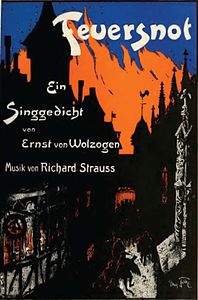Distress
| Work data | |
|---|---|
| Title: | Distress |

Title page of the piano reduction from 1901 |
|
| Original language: | German |
| Music: | Richard Strauss |
| Libretto : | Ernst von Wolzüge |
| Literary source: | Johann Wilhelm Wolf : The extinguished fire of Audenaerde |
| Premiere: | November 21, 1901 |
| Place of premiere: | Royal Opera House Dresden |
| Playing time: | approx. 1 ½ hours |
| Place and time of the action: | Munich on a solstice day |
| people | |
|
|
Feuersnot is a song poem or an opera in one act by Richard Strauss (op. 50). It is the composer's second stage piece. The libretto comes from Ernst von Wolzüge . The model was the Flemish fairy tale The Extinct Fire of Audenaerde from the Dutch sagas collection of Johann Wilhelm Wolf .
Feuersnot is an ironic piece of time against the pseudo-morality of Munich citizens in particular. After the premiere in the Royal Opera House in Dresden in 1901, the piece was discontinued at the request of the piqued Saxon royal family.
In the premiere, conducted by Ernst von Schuch , among others seemed Annie Krull (Diemut) and Karl Scheidemantel (Kunrad) and Ernst Wachter with (Jörg Pöschel which Leitgeb).
action
A crowd of children collects wood for the solstice celebration. They also receive sweets from Diemut, the mayor's daughter. The children also get rich presents from Kunrad, a somewhat strange citizen. Delighted by Diemut's beauty, following a sudden inspiration, he suddenly kisses her on the mouth in front of everyone without her consent. Although her Kunrad is quite likeable, Diemut feels humiliated and seeks revenge. In the evening she lures Kunrad with a Midsummer Night's song, whereupon he asks to enter her chamber. In a load basket she pulls it up a little, but then leaves the basket just before its destination. The neighbors rush over and mock the exposed lover. Then Kunrad uses magic to extinguish all lights and fires in the city - as long as they are not reignited "from a hot, virgin body". The citizens are terrified. They ask Diemut to end the spell with a love offering, whereupon she pulls Kunrad into her room in the dark and the lights and fires of the city flare up again.
Discography (selection)
- GA 1978: Gundula Janowitz , John Shirley-Quirk ; Erich Leinsdorf , Berlin Radio Symphony Orchestra with the Tölzer Knabenchor and the RIAS Chamber Choir, Deutsche Grammophon
- GA 1984: Bernd Weikl , Júlia Várady ; Heinz Fricke , Munich Radio Orchestra with the Tölzer Knabenchor and the Bavarian Radio Choir, Arts Musik
literature
- Leo Melitz: Guide through the operas . Globus-Verlag, Berlin 1914, pp. 87-88.
- Horst Seeger : Opera Lexicon . Heinrichshofen Verlag, Wilhelmshaven 1979, ISBN 3-7959-0271-1 , p. 194.
- Johann Wilhelm Wolf (ed.): Dutch sagas . Brockhaus, Leipzig 1843, pp. 492-495 ( online at Zeno.org ).
Web links
- Feuersnot, Op.50 : Sheet music and audio files in the International Music Score Library Project
- Action of fire emergency at Opera-Guide landing page due to URL change currently not available
- Discography about Feuersnot at Operadis
Individual evidence
- ^ Rainer Franke: Feuersnot. In: Piper's Encyclopedia of Musical Theater . Volume 6: Works. Spontini - Zumsteeg. Piper, Munich / Zurich 1997, ISBN 3-492-02421-1 , pp. 81-83.
- ↑ Holger Noltze: Feuersnot . Report from May 19, 2003 on Deutschlandfunk , accessed on November 3, 2016.
